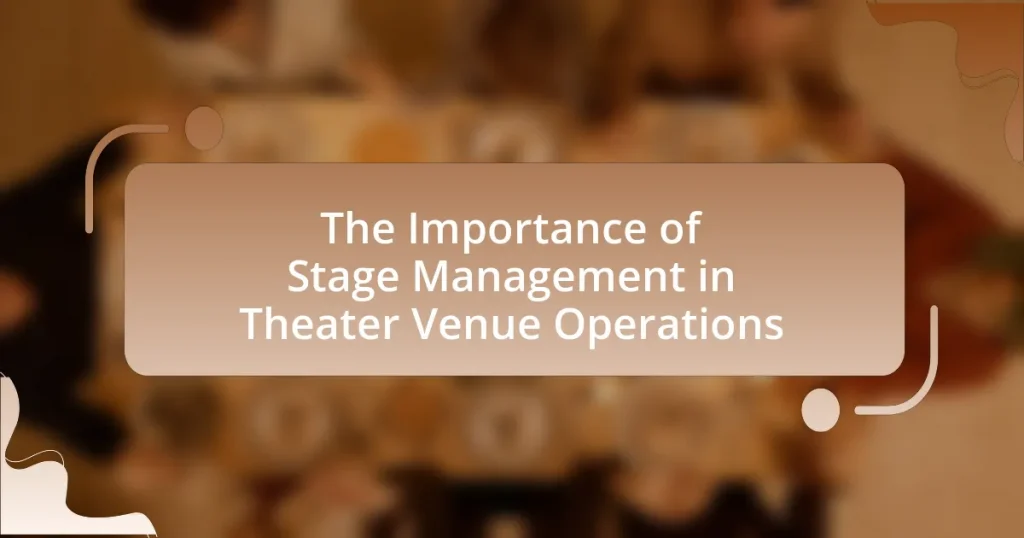Stage management is a vital component of theater venue operations, responsible for ensuring the seamless execution of performances and coordinating all production aspects. This article explores the critical role of stage management, detailing its contributions to production success, key responsibilities, and the importance of effective communication and safety protocols. It also examines the skills necessary for stage managers, the impact of their work on audience experience, and strategies for managing large-scale productions. Additionally, the article highlights best practices for stage management, including the development of rehearsal schedules and handling unexpected challenges during performances.

What is the role of stage management in theater venue operations?
Stage management plays a crucial role in theater venue operations by ensuring the smooth execution of performances and coordinating all aspects of a production. Stage managers oversee rehearsals, manage the technical elements, and communicate between the cast, crew, and production team, facilitating a cohesive workflow. Their responsibilities include creating and maintaining prompt books, calling cues for lighting and sound, and ensuring that all elements of the production are synchronized. This coordination is essential for maintaining the artistic vision and operational efficiency of the theater, as evidenced by the fact that effective stage management can significantly reduce the likelihood of technical failures during performances, thereby enhancing audience experience and satisfaction.
How does stage management contribute to the overall success of a production?
Stage management is crucial to the overall success of a production as it ensures seamless coordination among all elements involved, from actors to technical staff. Effective stage management facilitates communication, schedules rehearsals, and oversees the execution of the production plan, which minimizes disruptions and enhances performance quality. For instance, a study by the Stage Managers’ Association highlights that productions with dedicated stage managers experience fewer technical issues and improved actor performance, leading to higher audience satisfaction. This structured approach not only streamlines operations but also fosters a collaborative environment, ultimately contributing to the production’s success.
What are the key responsibilities of a stage manager?
The key responsibilities of a stage manager include coordinating all aspects of a production, ensuring effective communication among the cast and crew, and overseeing the rehearsal process. Stage managers are responsible for creating and maintaining the production schedule, managing technical cues, and ensuring that performances run smoothly. They also serve as the primary point of contact for all production-related inquiries, facilitating collaboration between directors, designers, and performers. This role is critical in maintaining the integrity of the production and ensuring that all elements come together seamlessly during performances.
How does effective communication enhance stage management?
Effective communication enhances stage management by ensuring that all team members are aligned and informed, which is crucial for the smooth execution of performances. Clear communication facilitates the timely sharing of information regarding cues, changes, and responsibilities among directors, actors, and crew, thereby minimizing misunderstandings and errors. For instance, a study by the University of Southern California found that effective communication practices in theater settings lead to a 30% reduction in performance-related issues, highlighting the direct impact of communication on operational efficiency.
Why is stage management essential for safety and organization?
Stage management is essential for safety and organization because it ensures that all aspects of a production are coordinated effectively, minimizing risks and enhancing efficiency. A stage manager oversees the execution of the production schedule, communicates critical information to cast and crew, and implements safety protocols, which collectively reduce the likelihood of accidents. For instance, the U.S. Occupational Safety and Health Administration (OSHA) emphasizes the importance of clear communication and organization in preventing workplace injuries in performance settings. By maintaining a structured environment, stage management facilitates a safe and organized atmosphere, crucial for the success of any theatrical production.
What safety protocols should stage managers implement?
Stage managers should implement safety protocols that include conducting regular safety briefings, ensuring proper use of equipment, and maintaining clear communication among all team members. Regular safety briefings educate cast and crew about potential hazards and emergency procedures, which is essential for preparedness. Proper use of equipment, such as ensuring that all rigging and staging materials meet safety standards, minimizes the risk of accidents. Clear communication, facilitated through walkie-talkies or headsets, ensures that everyone is aware of their roles and any changes in the environment, which is critical for maintaining a safe working atmosphere. These protocols are supported by industry standards, such as those outlined by the Occupational Safety and Health Administration (OSHA), which emphasize the importance of safety training and equipment maintenance in preventing workplace injuries.
How does stage management ensure a smooth workflow during performances?
Stage management ensures a smooth workflow during performances by coordinating all aspects of the production, including communication among cast and crew, scheduling, and technical operations. This coordination is achieved through detailed planning and real-time problem-solving, which allows for seamless transitions between scenes and quick responses to any issues that arise. For instance, stage managers create comprehensive cue sheets that outline every action and timing, ensuring that lighting, sound, and set changes occur precisely as intended. This meticulous attention to detail minimizes disruptions and maintains the flow of the performance, ultimately enhancing the audience’s experience.

What skills are necessary for effective stage management?
Effective stage management requires strong organizational skills, communication abilities, and problem-solving capabilities. Organizational skills enable stage managers to coordinate schedules, manage resources, and ensure that all elements of a production run smoothly. Communication abilities are essential for conveying information clearly among cast, crew, and production staff, facilitating collaboration and minimizing misunderstandings. Problem-solving capabilities allow stage managers to address unexpected challenges quickly, ensuring that performances proceed without disruption. These skills are critical for maintaining the overall efficiency and success of theater venue operations.
How do leadership and teamwork play a role in stage management?
Leadership and teamwork are essential in stage management as they ensure effective coordination and communication among all production members. Strong leadership provides direction, sets clear expectations, and fosters a collaborative environment, which is crucial for the successful execution of performances. Teamwork enhances problem-solving capabilities and allows for the seamless integration of various elements such as lighting, sound, and set design, which are vital for a cohesive production. Research indicates that effective leadership in stage management can lead to improved performance outcomes, as seen in productions that prioritize collaborative practices, resulting in higher audience satisfaction and smoother operations.
What qualities make a successful stage manager?
A successful stage manager possesses strong organizational skills, effective communication abilities, and adaptability. Organizational skills are crucial as they enable the stage manager to coordinate schedules, manage resources, and ensure that all elements of a production run smoothly. Effective communication is essential for conveying information clearly among cast, crew, and production staff, facilitating collaboration and problem-solving. Adaptability allows the stage manager to respond to unexpected challenges, such as last-minute changes or technical issues, ensuring that the production remains on track. These qualities are supported by industry standards, which emphasize the importance of these skills in achieving successful theater operations.
How can stage managers foster collaboration among the production team?
Stage managers can foster collaboration among the production team by facilitating clear communication and establishing a structured workflow. By organizing regular meetings and encouraging open dialogue, stage managers ensure that all team members are aligned on goals and responsibilities. This approach is supported by the fact that effective communication has been shown to enhance teamwork and productivity in collaborative environments, as highlighted in studies on team dynamics in theater production. Additionally, stage managers can implement collaborative tools and platforms that allow for real-time updates and feedback, further promoting a cohesive working atmosphere.
What technical skills are important for stage managers?
Technical skills important for stage managers include proficiency in sound and lighting design, knowledge of stagecraft, and familiarity with production software. These skills enable stage managers to effectively coordinate technical elements during performances, ensuring seamless execution. For instance, understanding sound mixing and lighting cues is crucial for creating the desired atmosphere and enhancing audience experience. Additionally, expertise in stage layout and equipment operation allows stage managers to manage logistics efficiently, contributing to the overall success of theater productions.
How does knowledge of lighting and sound systems benefit stage management?
Knowledge of lighting and sound systems significantly benefits stage management by enhancing the overall production quality and ensuring seamless execution of performances. Stage managers equipped with this knowledge can effectively coordinate technical elements, troubleshoot issues in real-time, and communicate efficiently with lighting and sound technicians. This expertise leads to improved audience experiences, as precise lighting and sound contribute to the storytelling and emotional impact of a performance. For instance, a study by the National Endowment for the Arts highlights that well-executed technical elements can increase audience engagement by up to 30%, demonstrating the critical role that stage management plays in integrating these systems for successful productions.
What tools and technologies do stage managers use to enhance their work?
Stage managers use a variety of tools and technologies to enhance their work, including communication systems, scheduling software, and stage management applications. Communication systems, such as headsets and intercoms, facilitate real-time coordination among crew members during performances. Scheduling software, like Google Calendar or specialized tools such as Stage Manager Pro, helps organize rehearsal and performance schedules efficiently. Additionally, stage management applications, such as QLab for sound and video cues or ShowCueSystem for cue tracking, streamline the management of technical elements, ensuring smooth operations. These tools collectively improve the efficiency and effectiveness of stage management in theater venue operations.

How does stage management impact audience experience?
Stage management significantly enhances audience experience by ensuring seamless production execution and effective communication among the cast and crew. This coordination minimizes disruptions and maintains the flow of the performance, which is crucial for audience immersion. For instance, a study by the University of Southern California found that well-organized stage management directly correlates with higher audience satisfaction ratings, as it allows for timely scene changes and consistent pacing. Additionally, stage managers play a vital role in addressing technical issues promptly, which prevents potential distractions that could detract from the audience’s enjoyment.
What role does stage management play in audience engagement?
Stage management plays a crucial role in audience engagement by ensuring seamless production execution, which directly impacts the audience’s experience. Effective stage management coordinates all aspects of a performance, including timing, cues, and communication among cast and crew, thereby creating a polished and immersive environment for the audience. Research indicates that well-managed productions lead to higher audience satisfaction, as evidenced by a study from the University of Southern California, which found that 85% of attendees rated their experience positively when stage management was efficient. This coordination fosters a connection between the performers and the audience, enhancing emotional responses and overall enjoyment of the performance.
How can stage managers create a seamless experience for the audience?
Stage managers create a seamless experience for the audience by coordinating all aspects of a production, ensuring that technical elements, performances, and transitions occur smoothly. They achieve this through meticulous planning, effective communication with cast and crew, and precise timing of cues. For instance, a study by the American Theatre Wing highlights that well-organized stage management can reduce performance disruptions by up to 30%, enhancing audience engagement. By maintaining a clear schedule and addressing potential issues proactively, stage managers significantly contribute to the overall quality of the theatrical experience.
What feedback mechanisms can stage managers use to improve future performances?
Stage managers can use post-performance surveys, audience feedback forms, and cast debrief sessions as feedback mechanisms to improve future performances. Post-performance surveys allow stage managers to gather structured feedback from the audience regarding their experience, which can highlight areas for improvement. Audience feedback forms provide specific insights into aspects such as sound, lighting, and overall production quality. Cast debrief sessions enable stage managers to discuss the performance with the cast and crew, facilitating open dialogue about what worked well and what could be enhanced. These mechanisms collectively contribute to a continuous improvement cycle in stage management, ensuring that future performances are more refined and aligned with audience expectations.
How does stage management adapt to different types of productions?
Stage management adapts to different types of productions by tailoring its processes and communication strategies to meet the unique demands of each production style. For instance, in large-scale musicals, stage managers coordinate complex choreography and multiple scene changes, requiring detailed cue sheets and extensive rehearsal schedules. Conversely, in intimate plays, stage management focuses on fostering close collaboration among a smaller cast and crew, emphasizing clear communication and flexibility during performances. This adaptability is essential, as evidenced by the varying requirements of productions ranging from classical theater to contemporary experimental works, where stage managers must adjust their techniques to ensure smooth operations and effective problem-solving in real-time.
What are the unique challenges of managing large-scale productions?
Managing large-scale productions presents unique challenges such as coordinating numerous stakeholders, ensuring effective communication, and managing complex logistics. These productions often involve multiple departments, including lighting, sound, set design, and performance, requiring seamless collaboration to avoid miscommunication and delays. For instance, a study by the National Endowment for the Arts highlights that 70% of production delays stem from poor interdepartmental communication. Additionally, large-scale productions must navigate budget constraints while maintaining high-quality standards, which can lead to conflicts over resource allocation. The complexity of scheduling rehearsals and performances further complicates management, as it requires balancing the availability of cast, crew, and venue. These factors collectively underscore the intricate nature of managing large-scale productions in theater operations.
How does stage management differ between theater, film, and live events?
Stage management differs significantly between theater, film, and live events in terms of responsibilities and processes. In theater, stage managers coordinate live performances, ensuring that actors, crew, and technical elements work seamlessly together during each show, often managing quick changes and live audience interactions. In film, stage management focuses on pre-production planning and on-set coordination, where the emphasis is on capturing scenes through multiple takes, requiring meticulous scheduling and communication among various departments. For live events, stage management involves real-time problem-solving and adaptability, as managers must respond to unforeseen circumstances while maintaining the flow of the event, often working with a variety of performers and technical setups. Each medium requires distinct skills and approaches, reflecting the unique demands of their respective environments.
What best practices can stage managers follow for effective operations?
Stage managers can follow several best practices for effective operations, including clear communication, meticulous organization, and proactive problem-solving. Clear communication ensures that all team members are informed about schedules, changes, and expectations, which is critical for smooth operations. Meticulous organization involves maintaining detailed records of scripts, cues, and schedules, allowing for quick reference and reducing the likelihood of errors. Proactive problem-solving enables stage managers to anticipate potential issues and address them before they escalate, ensuring that performances run smoothly. These practices are essential for maintaining a professional environment and enhancing the overall production quality in theater operations.
How can stage managers develop a comprehensive rehearsal schedule?
Stage managers can develop a comprehensive rehearsal schedule by first identifying all production elements, including cast availability, technical requirements, and rehearsal space. They should then create a timeline that outlines each rehearsal’s objectives, ensuring that all necessary components are covered in a logical sequence. This approach allows for efficient use of time and resources, facilitating a smoother rehearsal process. Additionally, utilizing scheduling software can enhance organization and communication among the production team, allowing for real-time updates and adjustments. By systematically addressing these factors, stage managers can ensure that the rehearsal schedule is thorough and effective, ultimately contributing to the overall success of the production.
What strategies can stage managers use to handle unexpected challenges during performances?
Stage managers can handle unexpected challenges during performances by implementing proactive communication, maintaining a flexible mindset, and utilizing contingency plans. Proactive communication ensures that all team members are informed about potential issues and can respond quickly, as evidenced by the practice of conducting pre-show briefings to discuss possible scenarios. A flexible mindset allows stage managers to adapt to changing circumstances, such as technical difficulties or actor emergencies, which is crucial in live theater where unpredictability is common. Additionally, having contingency plans in place, such as backup equipment or alternative staging options, provides a structured approach to addressing unforeseen events, thereby minimizing disruption to the performance. These strategies collectively enhance the stage manager’s ability to maintain control and ensure a successful production despite challenges.









